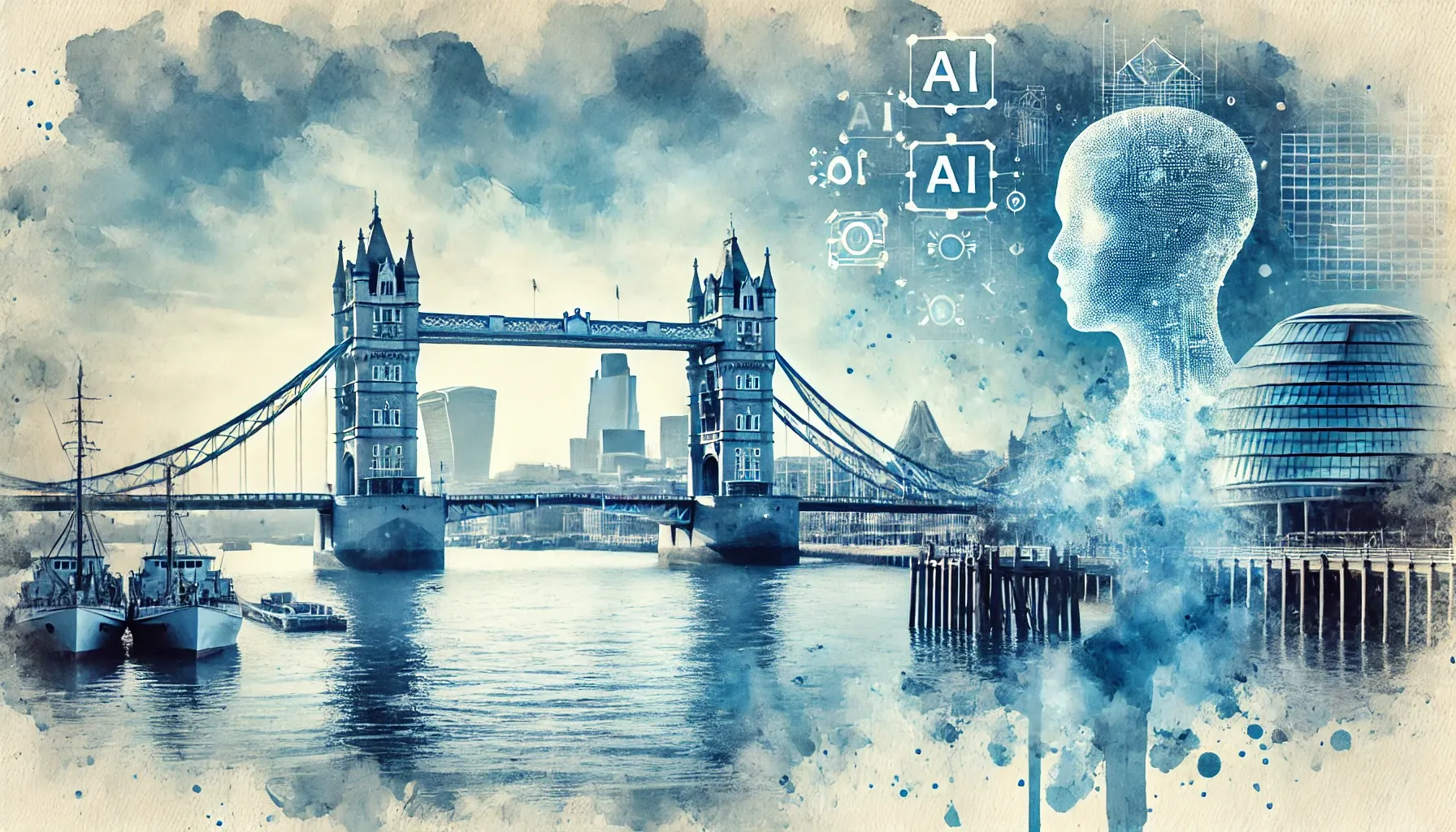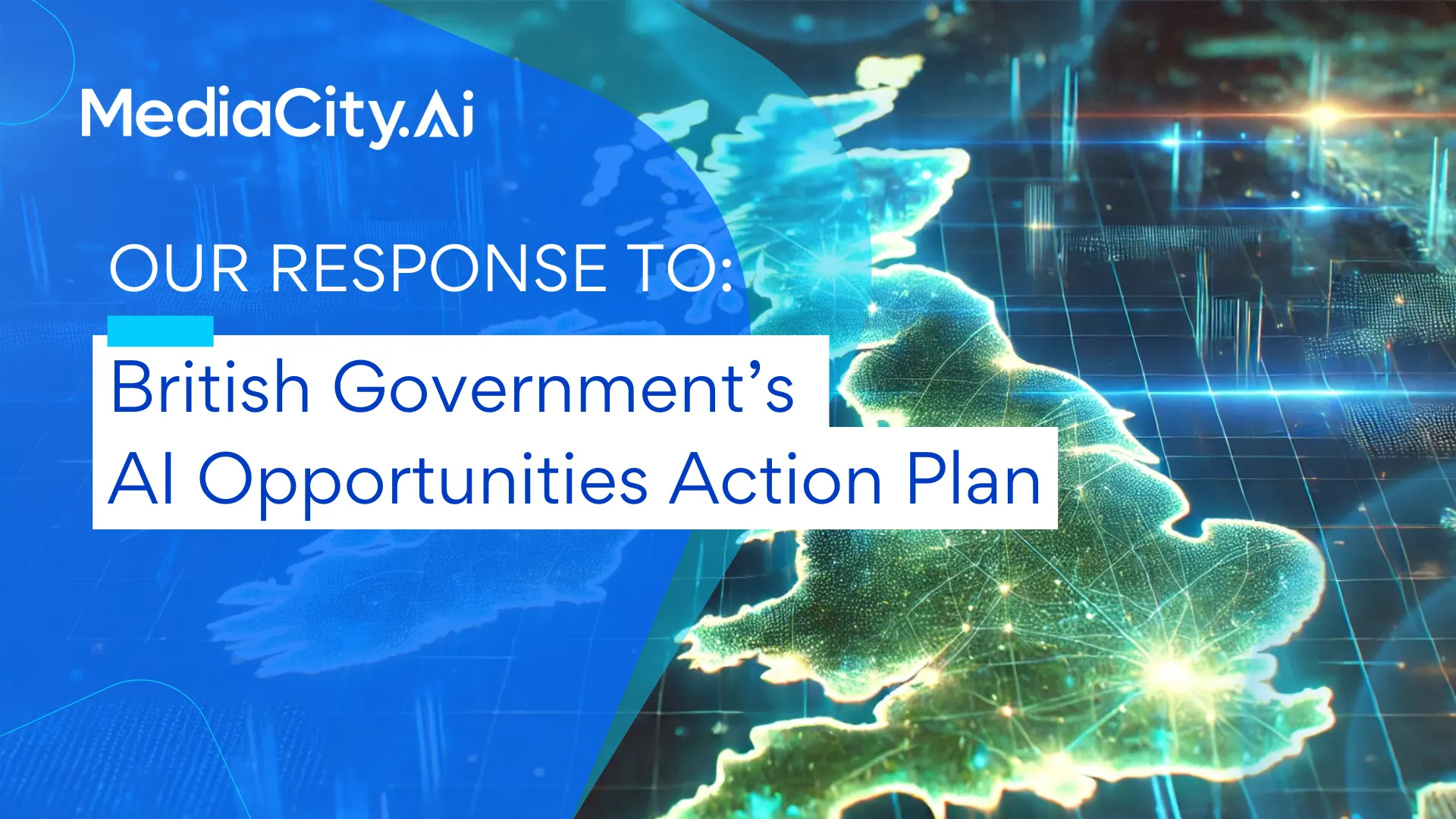How AI is Transforming the Media Landscape and Boosting Global Economies.

Artificial Intelligence (AI) is rapidly transforming industries across the globe, and the media landscape is no exception. From content creation and personalization to predictive analytics and media distribution, AI is opening new avenues for innovation, economic growth, and creative expression.
This transformation is reshaping how media is produced, consumed, and monetized. For businesses willing to pivot and embrace AI-driven opportunities, the rewards could be immense—not only for individual companies but for entire national economies.
One of the key players helping businesses navigate this exciting transformation is MediaCity.ai, an innovative company dedicated to harnessing AI's power to revolutionise media production and distribution.
As more companies explore AI’s potential in media, the ripple effects on GDP growth could be significant, with AI-driven media potentially contributing billions to national economies.
AI’s Transformation of the Media Landscape
The media industry is already seeing significant AI-driven changes that are reshaping its core operations. AI technologies like natural language processing (NLP), machine learning, and computer vision are enabling new ways to create, distribute, and personalise media content. Here are just a few ways AI is revolutionising media:
- AI-Generated Content: AI systems are now capable of generating written articles, video content, music, and even artwork. Companies like OpenAI and Google have been pioneers in this space with models like GPT and DALL·E, which can produce text and images autonomously. This democratisation of content creation is reducing production costs and opening up new opportunities for media companies to scale their creative efforts.
- Personalised Recommendations: AI’s ability to analyse user behaviour and preferences in real-time has led to hyper-personalised media experiences. Streaming giants like Netflix and Spotify use sophisticated AI algorithms to recommend content that matches individual tastes, increasing user engagement and retention .
- Predictive Analytics in Media: AI tools are transforming media planning and distribution by predicting trends, optimising content delivery schedules, and identifying emerging audience preferences. According to a study by PwC, AI could contribute $15.7 trillion to the global economy by 2030, with media being one of the key industries to benefit from these predictive capabilities .
- Automation of Production: AI is automating labour-intensive tasks in media production, from video editing and animation to sound mixing and dubbing. AI-driven tools like Adobe's AI-powered software are making it easier to produce high-quality content at a fraction of the traditional time and cost .
The Economic Impact: AI as a GDP Driver
As AI continues to infiltrate the media sector, its contribution to national GDP is becoming increasingly evident. Countries that lead the way in adopting AI in media could see significant economic benefits. According to research from McKinsey, AI has the potential to boost global GDP by 1.2% annually, with media and entertainment being one of the industries poised for major growth . This is driven by increased productivity, the creation of new media formats, and the ability to reach global audiences more effectively.
AI is not just creating efficiencies; it's enabling entirely new business models. For instance, AI-driven content personalization and predictive analytics are allowing companies to target new audiences and increase monetization opportunities. By leveraging AI to automate processes and optimise content delivery, media companies can lower operational costs while expanding their reach. This, in turn, drives economic growth, job creation, and innovation across the industry.
How Businesses Can Pivot and Benefit from AI in Media
With AI reshaping the media industry, businesses that embrace this change stand to gain a competitive edge. Here are a few strategies for companies looking to pivot into AI-powered media:
- Leverage AI for Content Creation: Businesses should explore AI tools that generate content, whether through text, visuals, or audio. AI-generated content can be used to supplement human creativity, helping media companies produce more content faster and at a lower cost.
- Invest in AI-Powered Personalisation: As consumers increasingly expect personalised experiences, media companies should invest in AI-driven personalization tools. These systems can help businesses tailor content, advertising, and recommendations to individual users, increasing engagement and revenue.
- Embrace Automation in Production: From editing to animation, AI can automate time-consuming processes, allowing businesses to produce higher-quality content more efficiently. Media companies that invest in AI-driven production tools will not only save on costs but also be able to scale their operations more effectively.
- Explore New Revenue Streams: AI enables companies to experiment with new business models, such as dynamic pricing, AI-powered media marketplaces, or even AI-generated influencers. These new revenue streams can help businesses diversify and stay ahead in an increasingly competitive market.
MediaCity.ai: Leading the AI Revolution in Media
At the forefront of this AI-driven transformation is MediaCity.ai, a company dedicated to empowering media organisations with cutting-edge AI solutions. MediaCity.ai is helping businesses streamline their production processes, enhance content creation, and unlock new distribution channels through its AI-driven platforms.
MediaCity.ai’s platform leverages the latest AI advancements to help companies create personalised, engaging content at scale. By automating labour-intensive tasks and providing insights through predictive analytics, MediaCity.ai is enabling media organisations to stay ahead of the curve in a rapidly evolving industry. Their role in the media revolution is critical, as they provide the tools and expertise needed to help businesses harness AI's full potential in media.
Moreover, as AI adoption grows, MediaCity.ai's innovations have the potential to significantly contribute to a country’s GDP. By increasing the efficiency of media production, facilitating global distribution, and driving new monetization strategies, MediaCity.ai is poised to play a key role in bolstering the media sector’s economic impact.
The UK AI Council's AI Roadmap: How MediaCity.ai Can Leverage National AI Initiatives for Media Innovation

The UK AI Council's AI Roadmap, a comprehensive document released in 2021, provides a strategic framework for positioning the United Kingdom as a global leader in artificial intelligence. The roadmap emphasises AI’s critical role in driving innovation, economic growth, and societal well-being, while also outlining key areas for investment, research, and development to maintain the UK's competitive edge in AI.
The roadmap focuses on several key objectives, including fostering innovation through increased funding, developing AI talent, promoting collaboration between the public and private sectors, and addressing societal and ethical challenges posed by AI. While the AI Roadmap spans multiple sectors:
- Healthcare
- Education
- Transportation, and more
It leaves a notable gap when it comes to the media industry. This is where MediaCity.ai has identified a unique opportunity to fill that void and capitalise on AI's transformative potential in the media sector.
Key Objectives of the UK AI Roadmap
1. Building a Strong AI Ecosystem: The roadmap calls for increased investment in AI research and infrastructure to accelerate innovation across industries. It emphasises the importance of creating an AI-friendly regulatory environment and developing a national AI research and innovation ecosystem that fosters collaboration between academia, industry, and government.
2. Developing and Retaining AI Talent: A key priority of the roadmap is to invest in the development of AI talent by creating specialised education programs, improving digital skills, and ensuring that the UK’s workforce is equipped to thrive in an AI-driven economy. This includes funding for AI training programs and initiatives to ensure diversity and inclusion in AI fields.
3. Supporting AI Adoption Across Sectors: The roadmap advocates for greater AI adoption across various sectors, including public services, to drive productivity, innovation, and economic growth. It calls for industry-specific AI applications and encourages the creation of sector-specific AI strategies to support targeted innovation.
4. Promoting Ethical and Responsible AI: The roadmap outlines the need to address the ethical challenges posed by AI technologies, including issues related to transparency, accountability, and bias. The UK AI Council encourages responsible AI innovation that benefits society while minimising risks.
MediaCity.ai's Strategic Alignment with the UK AI Roadmap
While MediaCity.ai is not officially part of the UK AI Council, the company has identified a clear gap in the roadmap's application to the media industry—a sector poised for immense transformation through AI. By strategically aligning with the broader objectives of the UK AI Roadmap, MediaCity.ai aims to position itself as a leader in AI-driven media innovation, leveraging the national focus on AI development to exploit this underserved niche.
1. Fostering Media Innovation: MediaCity.ai is positioned to take advantage of the government's push for AI innovation by focusing on the media industry. The company's AI-driven media production tools and platforms align with the roadmap’s goal of fostering cross-sector AI adoption. MediaCity.ai can work to accelerate the integration of AI in media production, content distribution, and personalization, filling the void identified in the AI roadmap and setting new standards for media technology.
2. Developing Media-Specific AI Talent: With the roadmap’s focus on AI talent development, MediaCity.ai can become a pivotal player in training and upskilling media professionals to thrive in an AI-driven media ecosystem. By offering specialised AI training and resources tailored for the media industry, MediaCity.ai could create a dedicated talent pipeline that supports the UK's broader AI talent strategy while addressing the specific needs of the media sector.
3. Creating a Sector-Specific AI Strategy for Media: As the roadmap advocates for sector-specific AI strategies, MediaCity.ai has the opportunity to carve out a leading role in developing and implementing AI strategies for the media industry. By focusing on AI applications in media, such as content creation, AI-powered editing tools, and personalised media experiences, MediaCity.ai can help accelerate AI adoption in this critical sector, ensuring that the UK remains at the forefront of media technology innovation.
4. Championing Ethical AI in Media: The AI Roadmap’s emphasis on ethical AI innovation provides an opportunity for MediaCity.ai to lead in the responsible use of AI in media. MediaCity.ai can establish itself as a model for ethical AI practices in content creation, ensuring transparency, reducing bias, and promoting accountability in AI-generated media. By doing so, the company aligns itself with the UK AI Council’s focus on fostering trustworthy AI, while also differentiating itself as a leader in ethical media innovation.
Leveraging the UK’s AI Ecosystem for Media Growth
With its headquarters in London—a global hub for AI excellence—MediaCity.ai is well-positioned to tap into the UK’s thriving AI ecosystem, which is bolstered by the government's commitment to AI development as outlined in the AI Roadmap. London is home to AI giants such as DeepMind, Stability AI, and BenevolentAI, companies that have revolutionised sectors from healthcare to hardware and have been supported by the UK's robust AI infrastructure.
MediaCity.ai can leverage this ecosystem to collaborate with leading AI researchers, attract top AI talent, and secure funding to drive AI-driven media innovation.
By filling the gap identified in the UK AI Roadmap and aligning with the broader national strategy, MediaCity.ai can help shape the future of media production and distribution in the UK and beyond.
As the UK continues to invest in AI innovation and talent, MediaCity.ai’s focus on the media industry positions it to contribute significantly to both the local and global media landscape, driving economic growth and reinforcing the UK’s position as a leader in AI technology.
Global Cities Partnering with MediaCity.ai: Building the Future of AI-Driven Media
As AI's potential continues to expand, cities across the globe have the opportunity to position themselves as leaders in AI-driven media innovation. By partnering with MediaCity.ai, cities can tap into a wealth of AI expertise and resources to help them navigate the complexities of AI adoption while driving local economic growth. MediaCity.ai, based in London—a global hub of AI excellence—is well-placed to support cities looking to accelerate their media industries through AI.
London is home to world-renowned AI companies like DeepMind, which pioneered advancements in AI research and development, Stability AI was founded by Emad Mostaque as the first open-source, artificial intelligence (AI) company developing breakthrough technologies for the benefit of humanity and the world and Graphcore, a leading player in AI hardware innovation.
Additionally, BenevolentAI, an AI-driven drug discovery company, has also grown from London's thriving AI ecosystem. The presence of these companies underscores London’s leadership in the AI industry, making it the ideal location for MediaCity.ai to base its operations .
Cities looking to establish themselves as regional leaders in AI can benefit from MediaCity.ai’s extensive AI capabilities in media production, training, and startup acceleration. By creating AI innovation hubs similar to those in London, cities can attract new investments, generate high-quality jobs, and foster a tech-driven creative economy. This, in turn, can boost local GDP, positioning cities as key players in the global AI economy.
Driving Economic Growth and Job Creation through AI Partnerships
By partnering with MediaCity.ai, cities can not only leverage AI to transform their media industries but also drive broader economic growth. AI adoption can lead to significant job creation in sectors such as content creation, software development, data analytics, and digital marketing. According to Accenture, AI has the potential to increase the annual growth rate of economies like the US by up to 2% by 2035.
Through collaboration with MediaCity.ai, cities can build robust AI ecosystems that encourage innovation, entrepreneurship, and the development of AI-driven media startups. These partnerships will help cities and countries harness AI’s potential to generate sustainable growth, enhance their global competitiveness, and create a vibrant future for their citizens.
Here are FAQs tailored to the media sector:
These answers focus on how AI is applied specifically to the media sector, touching on both its benefits and current limitations.
1: Where is AI used in the Media Sector?
Artificial Intelligence (AI) is revolutionising the media industry, touching every aspect of production, distribution, and consumption. From automating content creation, such as AI-generated news articles and video editing, to personalising content recommendations on streaming platforms like Netflix, AI is driving innovation.
AI is also being used in predictive analytics to forecast audience trends, automate subtitling and translation, and even assist in casting and scriptwriting. Media companies are leveraging AI to optimise advertising, analyse viewer sentiment, and streamline the entire content production pipeline, enhancing both creativity and operational efficiency.
2: How do we use AI in Media in Everyday Life?
In the media sector, AI plays a critical role in enhancing user experiences on a daily basis. Whether you're watching a show recommended to you by Netflix's AI-powered algorithms, enjoying music playlists curated by AI on Spotify, or engaging with AI-driven interactive content in video games, AI is constantly at work behind the scenes.
AI is also used in content moderation on social media, ensuring that inappropriate content is flagged and removed quickly, and in news aggregation services, where AI curates stories based on your interests.
3: What are the Social Benefits of AI in the Media Industry?
AI in the media sector offers numerous social benefits. For example, AI-driven accessibility tools like real-time transcription, closed captioning, and translation services make media content more accessible to people with disabilities and those who speak different languages.
AI can also help create more inclusive media by analysing data to uncover biases and suggesting more diverse representation in content. Additionally, AI helps amplify underrepresented voices by making it easier for independent creators to produce and distribute their work on platforms like YouTube, TikTok, or podcasting services.
This democratisation of media helps foster diversity and enriches the media landscape for all.
4: What is AI Bad at in the Media Sector?
While AI can enhance media production and distribution, it still struggles with the nuances of human creativity, emotion, and abstract thinking. AI may efficiently generate content, but it lacks the deep storytelling instincts, cultural sensitivity, and creativity that human creators bring to the table.
In complex tasks like interpreting satire or subtext in narratives, AI falls short. Additionally, while AI can analyse audience data and predict trends, it may struggle to fully understand and replicate the emotional connections between audiences and content.
For now, AI serves as a powerful tool in the media sector but still relies heavily on human oversight and creativity to produce emotionally resonant and meaningful content.
References:
1. McKinsey & Company. "The Impact of AI on the Global Economy." Retrieved from: [McKinsey Report]
2. Netflix Tech Blog. "Personalization at Netflix: How AI Is Used to Drive Content Recommendations." Retrieved from: [Netflix Tech Blog]
3. PwC. "AI to Add $15.7 Trillion to the Global Economy by 2030." Retrieved from: [PwC Report]
4. Adobe Blog. "AI-Powered Creativity: How AI is Shaping the Future of Media Production." Retrieved from: [Adobe Blog]
5. McKinsey Global Institute. "AI and Economic Growth: Mapping the Global Potential." Retrieved from: [McKinsey Global Institute]
6. London & Partners. "The Growth of London’s AI Industry: A Global AI Hub." Retrieved from: [London & Partners AI Report]
7. Graphcore. "Powering the Future of AI Hardware from London." Retrieved from: [Graphcore Report]
8. Accenture. "AI: The Future of Economic Growth?" Retrieved from: [Accenture AI Study]
9. AI Council, UK AI Council's AI Roadmap

